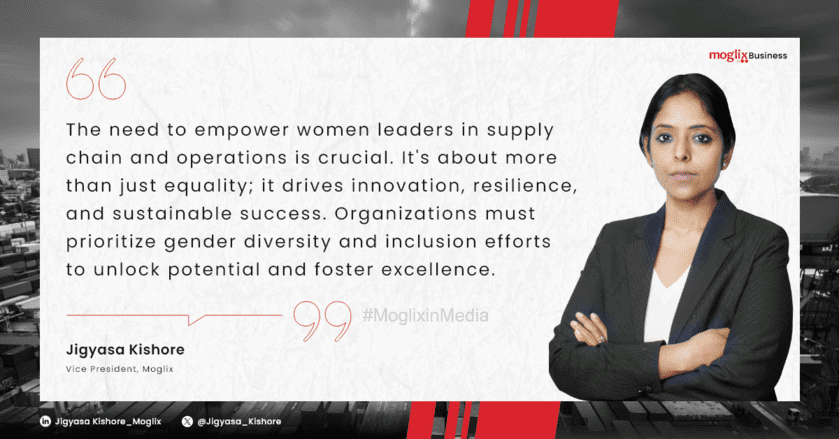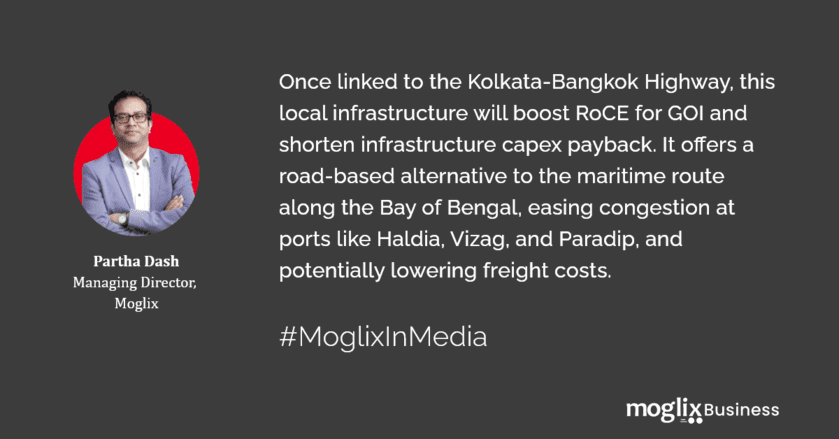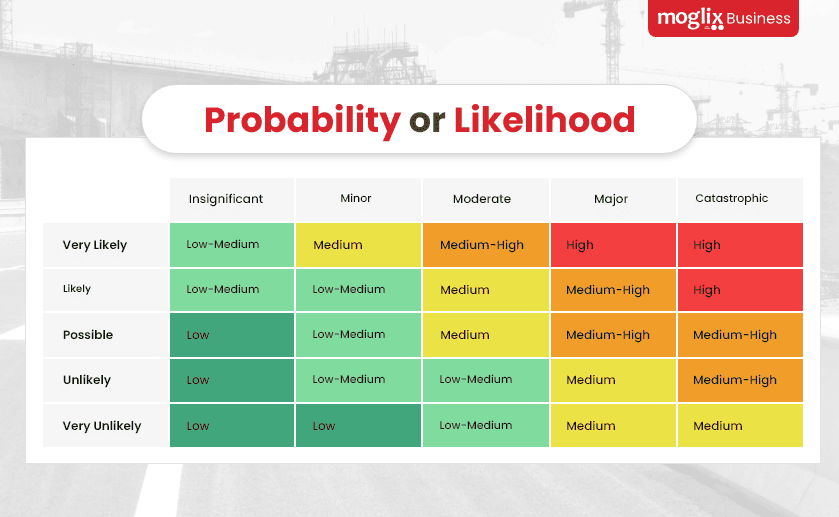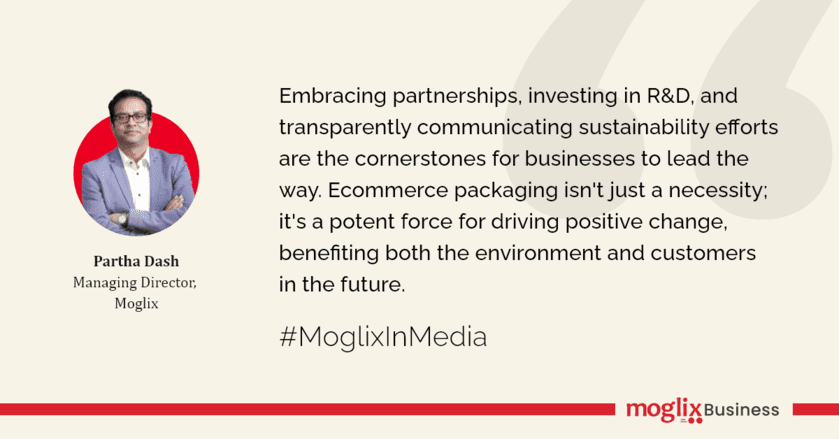Women are emerging as leaders in the supply chain and operations landscape.

Women are emerging as leaders in the supply chain and operations landscape.
As the global marketplace continues to evolve, our perception of leadership must evolve alongside it. Gender diversity isn’t merely a trend—it’s a crucial strategic necessity. Research consistently demonstrates that teams with diverse backgrounds outperform those lacking diversity, bringing a wealth of perspectives and experiences that drive innovation and resilience.
Within the dynamic realm of supply chains and operations, a silent revolution is taking place. Women, formerly confined to the sidelines, now stand at the forefront, breaking stereotypes and reshaping conventional notions of leadership within this complex network. In this article, we will delve into the significance of empowering women leaders in supply chain and operations. By challenging traditional norms, promoting inclusivity, and embracing diversity and innovation, women leaders play a pivotal role in driving organizational success.
Why CEOs of Hard-to-Abate Industries in India Should Consider Investing in CCUS?

Why CEOs of Hard-to-Abate Industries in India Should Consider Investing in CCUS?
As per the Paris Agreement, all nations worldwide are committed to reducing greenhouse gas (GHG) emissions by 45% by 2030 and reaching net zero by 2050. In this regard, reducing emissions from various industries is a great challenge. This is especially challenging for hard-to-abate industries like steel, cement, and chemicals. These industries are crucial for economic development. Yet, they account for about 30% of the world’s greenhouse gas emissions. The CCUS technology (carbon capture, utilization, and storage) is a possible solution. Let’s understand how CCUS is an ideal investment for Indian CEOs of hard-to-abate industries to tackle GHG emissions effectively.
What is CCUS?
CCUS represents a series of processes to capture CO2 directly from fossil, biomass stations, industries, or air and convert it for various applications. Once captured, the CO2 is transported by ship or pipeline to the point of storage or application. There, it gets processed for various applications. Majorly, it is used for enhanced oil recovery (EOR) or the production of low-carbon fuels like methanol. The same can be used as an input or feedstock to create products or services. Otherwise, the CO2 is securely stored in geological formations so that it does not enter the atmosphere and harm the climate balance. .php?post=24032&action=editCCUS represents a series of processes to capture CO2 directly from fossil, biomass stations, industries, or air and convert it for various applications. Once captured, the CO2 is transported by ship or pipeline to the point of storage or application. There, it gets processed for various applications. Majorly, it is used for enhanced oil recovery (EOR) or the production of low-carbon fuels like methanol. The same can be used as an input or feedstock to create products or services. Otherwise, the CO2 is securely stored in geological formations so that it does not enter the atmosphere and harm the climate balance.
What CCUS Technologies Are Available Today?
Some major CCUS technologies are available today to handle carbon emissions easily. Let’s understand how CO2 is processed under these CCUS technologies.
- Direct Air Capture (DAC): Collected directly from the using air filters
- Carbon Capture at Power Plants: CO2 is captured from power plants and processed for storage or enhanced oil recovery.
- Enhanced Rock Weathering (ERW): Crushed silicate minerals like basalt and glauconite increase the soil’s CO2 capture capacity.
- Aqueous Amine-Based CO2 Capture: Using amines to absorb CO2 for storage or reuse
- Membrane Gas Separation: Using permeable materials to separate carbon dioxide and other gasses at low temperatures and pressures
- Carbon Capture and Conversion: Converting the captured CO2 into usable products such as fuels, industrial chemicals, and polymers.
- Chemical looping: Using metal-based particles to separate CO2 from the fuel for storage and further reuse
- Cryogenic Carbon Capture (CCC): Leveraging cryogenic cooling to capture and remove CO2 from gas streams
- Carbon Capture Using Nanotechnology: Carbon nanotubes capture CO2 at a very low pressure
CCUS Global Application and Potential in India
CCUS has been gaining popularity for its effectiveness in handling carbon footprints from the environment. As per the IEA report, around 40 commercial facilities have benefited from applying CCUS to their industrial processes. It has been used as one of the primary ways of carbon capture and utility storage. Though CCUS deployment slowed down in the past, in recent years, it’s been under development for over 500 projects across the CCUS value chain.
How will Implementing CCUS Benefit Industries?
CEOs in India can leverage CCUS to:
- Meet Net-Zero Goals: India has committed to achieving net-zero emissions by 2070. In this regard, CEOs of hard-to-abate industries can use CCUS, which has already been a proven and effective method worldwide, to contribute significantly to achieving this ambitious green transition.
- Improve Energy Security: Companies can utilize the captured CO2 for EOR, like in the Ankleshwar oil field CO2-EOR project in Cambay Basin, India. This can enhance India’s energy security by extracting more oil from existing fields. As a result, it can reduce dependence on imported fuels and strengthen energy independence.
- Creating Economic Opportunities: The application of CCUS in Industries will unlock new job opportunities in India. Companies would require manpower to construct, operate, and maintain CCUS technologies, which will indeed create a positive economic impact.
- Have a Competitive Edge: As the global market increasingly focuses on low-carbon products, adopting CCUS allows Indian industries to remain competitive and adapt to changing market demands.
End Game: Accelerating Clean Energy Transition in India
For CEOs of hard-to-abate industries in India, CCUS is not just an option but a strategic necessity. CCUS application can promise industries long-term sustainability, contribute significantly to India’s green transition goals, and create a cleaner and brighter future for the nation. As the world moves towards a low-carbon future, adopting CCUS allows Indian industries to have a competitive edge in the market and attract new investors.
Are you looking forward to stepping up your industry’s strategy to reduce carbon emissions?
Visit our website to learn how Moglix Business custom fabrication solutions can accelerate your clean energy transition
The Kolkata-Bangkok Highway: A Superior Choice Over Tianxia

The Kolkata-Bangkok Highway: A Superior Choice Over Tianxia
In Chinese, ‘Tianxia’ signifies ‘a community of shared destiny,’ representing profound interconnectedness. Despite its historical reverence, recent years have seen numerous supply chain disruptions due to the pandemic, geopolitical tensions, and overreliance on the South China Sea. It’s apparent that ‘Tianxia’ has faltered in delivering its promised monopoly over the global manufacturing supply chain. Is there a superior option?
Enter the Kolkata-Bangkok Highway, conceived by a nation offering democracy, demand, and a decisive policy framework for business facilitation: India.
Read MoreHow COOs of EPC Infrastructure Project Developers Can Use the Incident Matrix to Craft Agile Responses for Safety?

How COOs of EPC Infrastructure Project Developers Can Use the Incident Matrix to Craft Agile Responses for Safety?
Imagine you’re a confident project manager, all set to complete the project on time and within the budget. Your team starts working tirelessly to meet the deadlines – and then an unexpected risk that you never saw coming halts your project. Now, you have no idea how to get back on track and complete the project. However, you might have prepared to overcome the challenge only if you had assessed its probability through a risk incident matrix.
What is an Incident Matrix?
Regarding project management, the incident matrix is a structured framework that clubs potential hazards into different groups based on their severity and likelihood. That’s why it serves as a roadmap for COOs of EPC infrastructure project developers to create predefined response plans with necessary actions for each scenario. When COOs use the incident matrix with advanced AI technologies, they develop robust, agile responses to handle downtime, keeping workforce safety and ideal project momentum as priorities.

How to Use the Incident Matrix to Create Agile Responses
1. Alert Comes In: Predictive AI
The first step is to detect potential issues well in advance through predictive AI accurately. AI can analyze vast data to identify patterns in this initial stage. By continuously monitoring various project parameters, such as equipment sensor readings, weather forecasts, and historical incident data, predictive AI can anticipate potential issues before they escalate into full-blown incidents.
For instance, the predictive AI system monitoring bridge construction might detect abnormal sensor readings in line with a potential structural issue to raise early warnings. This can help the COO to be proactive and initiate additional inspections to prevent a more serious incident.
2. Diagnose: Generative AI
Once an alert is triggered, the next step is to understand the nature and root cause of the incident. Traditionally, this diagnosis relied on human expertise and experience. However, being trained on vast datasets of such incident scenarios, generative AI can suggest an ideal course of action backed with real-time insights. For example, it can highlight potential causes of a rotor malfunction in a rotating shaft based on past sensor data analysis to help maintenance teams save time.
3. Repair: Operations & Maintenance Procurement
With the correct diagnosis, COOs use the incident matrix to decide on an appropriate repair strategy. Depending on the class of severity and degree of urgency, the COO might initiate the procurement of safety goods, spare parts, or specialized repair services.
Here, maintaining an efficient infrastructure supply chain becomes crucial to promptly collecting all necessary resources, minimizing downtime, and easily reducing potential safety risks.
For example, suppose a faulty safety harness needs to be replaced on a construction site. In that case, the COO can utilize pre-established procurement channels to expedite the acquisition of a new harness without compromising worker safety at any cost.
4. Correct Behavior: FMEA Analysis
As per the PMI, analyzing risks is extremely important in project management. By incorporating FMEA principles (Failure Mode and Effect Analysis) into the incident matrix, COOs can use past incidents as valuable learning experiences. FMEA is a systematic approach to identifying potential failure modes within a system, analyzing their effects, and implementing corrective actions to mitigate those risks. Siemens uses FEMA to detect failure modes in components by starting with functional requirements analysis of the parts, which includes warping, electrical short circuits, oxidation, and fracture.
5. Replace: Project Procurement
Sometimes, the incident might necessitate replacing a faulty component or system. Under such a scenario, COOs use efficient project procurement practices for the timely acquisition of replacement parts or equipment with minimal disruption to the project schedule. With procurement automation, it’s possible to reduce the purchase order cycle by 75% and invoice processing costs by up to 90%.
End Game: Enabling Agile Responses for Safety
When combined with AI and efficient procurement practices, the incident matrix empowers COOs of EPC infrastructure project developers to craft agile and effective responses to unforeseen incidents. Using this framework, COOs can minimize downtime and project delays through prompt detection. It can also help in enhancing safety by proactively addressing potential hazards. To summarize, the incident matrix is the key for COOs to reduce project costs by preventing recurring incidents with an efficient procurement process in place.
Do you want to craft agile and effective responses to unforeseen incidents by leveraging an incident matrix powered by digital supply chain transformation?
Explore Moglix Business procurement solutions and best practices on safety to learn more.
Unveil the Future: Sustainable Packaging Innovations in Online Retail

Unveil the Future: Sustainable Packaging Innovations in Online Retail
Step into a world where every click in an online store doesn’t just make shopping convenient but also leaves a positive mark on the environment. In today’s bustling eCommerce world, the unassuming package takes center stage – it’s more than just a box; it’s the first tactile connection with your purchase, a silent messenger for the brand, and sometimes, a cause for concern regarding waste. But amidst these challenges, a wave of innovation is sweeping in, changing the game and offering hope for a more sustainable future.
Read MoreStrategies for CPOs to Navigate Times of Inflation

Strategies for CPOs to Navigate Times of Inflation
Introduction
According to the J.P. Morgan research, inflation for 2024 will likely remain around 3% [1]. The economic winds are shifting, and inflation is on the rise. This presents a significant challenge for CPOs across all industries. They are facing procurement challenges with rising raw materials, transportation, and labor costs. However, amidst the turmoil lies opportunity. CPOs need strategic approaches to mitigate inflation and come out stronger for future challenges.
Understanding the Current Scenario
Before diving into strategies, it’s crucial to acknowledge the current scenario. Global events and supply chain disruptions due to the Panama Canal [2] and the Suez Canal [3] continue to fuel inflation. Geopolitical tensions across these crucial trade corridors force many companies to redraw decade-old trade maps. They are impacting MRO supplies and driving up procurement costs. This volatility makes accurate forecasting and cost management more critical than ever.
Building a Fortified Supply Chain
Optimizing eProcurement Process
Streamlining the eProcurement process helps in informed decision-making. For instance, a company can use EDI and procurement software powered by supply chain analytics to fetch real-time data for price trends, supplier performance, and contract terms. This transparency can help the company to identify cost-saving opportunities and negotiate more effectively.
Diversifying Your Vendor Base
As per the Deloitte report, organizations with regional supplier diversification are less likely to be impacted by disruptions. Reliance on a single supplier can induce a price monopoly. Instead, having a wide vendor network with regional diversification will foster competition and reduce costs. For instance, GM has announced a deal with Livent and LG Chem to buy lithium and cathode to mitigate the risk of building 1 million EV cars by 2025 [4].
Mastering Inventory Management
Excess inventory ties up capital and increases vulnerability to price fluctuations. Implement lean inventory management practices like Just-in-Time (JIT) delivery and Kanban systems. For instance, big brands like Walmart and Target optimize inventory levels for specific items as per demand forecasting to minimize holding costs and ensure a steady cash flow throughout the year.
Collaborating with Suppliers
Nearly 56% [5] of procurement teams use technology to foster strong, collaborative relationships with their suppliers. However, as per the PwC’s survey [6], more than technology, it’s about the company’s ability to adapt and change with the situation. Consider collaborative planning, forecasting, and replenishment (CPFR) to optimize your and your supplier’s operations.
Optimizing MRO Supply
According to DXP head, digitization is the key to successful supply chain management. It starts with data and is enhanced with procurement analytics. For instance, this method of MRO optimization in the cotton industry can help the company quickly identify supply chain bottlenecks to minimize procurement error, minimize waste, and improve cotton production rate across the board. Learn more about how Moglix helped an EPC firm bring agility to the supply chain in this detailed case study.
Bottom Line
By diligently implementing these strategies, CPOs can transform challenges into opportunities. Once you learn how to hold steady in an inflation storm, you can easily safeguard your organization’s bottom line and build a more resilient and adaptable supply chain for the future.
Looking for a robust eprocurement model to beat inflation?
Partner with Moglix Solutions! Visit our website to learn more.
References:
- https://www.jpmorgan.com/insights/global-research/economy/global-inflation-forecast
- https://www.wsj.com/business/logistics/panama-canal-to-halve-daily-sailings-this-winter-due-to-drought-3bd70c79
- https://www.wsj.com/business/logistics/thats-two-for-two-the-worlds-other-big-canal-is-in-trouble-f9760523
- https://energy.economictimes.indiatimes.com/news/power/gm-signs-agreements-with-suppliers-on-course-to-reach-1-million-ev-capacity-by-2025/93136038
- https://www.kodiakhub.com/blog/top-10-stats-supplier-relationship-management-software-market
- https://www.pwc.com/gx/en/services/consulting/digital-operations/digital-procurement-survey.html
Role of Occupational Safety Practices in Protecting Tunnel Workers

Role of Occupational Safety Practices in Protecting Tunnel Workers
Introduction
The harrowing incident at the Silkyara tunnel in Uttarkashi [1], where 41 laborers were trapped for 17 days, tragically highlights the vital role of safety equipment and industrial safety equipment in protecting these brave individuals. But it goes beyond just physical protection; proper safety rules in the industry are crucial for tunnel workers’ mental and emotional well-being as well.
Aftermath of the Incidence
Following the Silkyara incident, where rescuers heroically saved 26 workers, a strange reality appeared. More than half the rescued laborers refused to return to the project. The trauma of the experience left them deeply affected. This indicates the profound impact of safety mishaps on workers’ lives. This incident underscores that prioritizing safety rules in the industry is not just about compliance; it’s about protecting lives and creating a healthy work environment.
How Safety Equipment and Protocols Guard Lives
Though every project has a unique tunnel safety manual (e.g., Mumbai Coastal Road Project), the basic OHS&E guidelines are the same. Tunnel construction presents a unique set of hazards. Workers might face challenges from different elements and situations inside the tunnel. For instance, falling debris or unstable rock formations can pose a threat from the top. They might also be exposed to dust, fumes, noise, etc.
In this regard, they need appropriate safety equipment to create the first defense against these threats.
The list of some common safety equipment includes but is not limited to:
- Hard hats
- Goggles
- Respirators
- Sturdy boots,
Additionally, industrial safety equipment, like ventilation systems, ground support systems, and emergency communication devices, also help provide workers with an additional layer of safety.
Beyond physical protection, safety protocols are a roadmap for safe work practices. These protocols include:
- Regular inspections of the site are mandatory. For instance, workers need to equip themselves with proper safety helmets and gumboots if there is cramped working space or slippery flooring.
- All equipment needs to be kept in good condition.
- Create a proper workplace health and safety guide and encourage workers and other administrators to follow that at all costs. Look for inspiration in the workplace safety guide [2] of Schlumberger, the world’s biggest oilfield services company.
Conclusion – Investing in Safety Pays Off
Prioritizing the industry’s safety equipment, industrial safety equipment, and safety rules might seem like an additional cost, but the benefits far outweigh the expense. A robust workplace safety protocol ensures the safety of your workers and improves your brand reputation with reduced chances of accidents, project delays, and legal liabilities.
Looking to build a safe work environment that attracts and retains skilled workers to increase productivity and project success?
Partner with Moglix Solutions! Visit our website to learn more.
References:
Things to Consider While Choosing Safety Helmets

Things to Consider While Choosing Safety Helmets
Introduction
The safety officers and procurement of high-risk sectors must practice due diligence while choosing safety helmets for their staff.
According to research, staff at high-risk sites who wear an industrial safety helmet mitigate the likelihood of brain injury by 50% [1]. Also, OSHA’s recent decision [2] to replace traditional hard hats with improved safety helmets in the construction and oil and gas industries demonstrates a commitment to improving worker safety.
This blog outlines the features of safety helmets for best practices.
Helmet’s purpose and standards
Helmets vary from bump caps, designed for minor knocks, to high-performance industrial helmets for high-risk environments like mining. Lightweight helmets suit low-risk tasks where minimal head protection is needed, whereas standard and industrial helmets offer more substantial protection from potential impacts from falling objects. Climbing helmets, adapted for fall-risk tasks, ensure the helmet remains secured. Each helmet type aligns with specific standards,
- Bump Cap (EN 812): Minimal protection, suitable for low-impact environments like warehouses or maintenance work.
- Lightweight Safety Helmet (EN 397 Lightweight): For low-risk areas, head protection is needed against small, flying objects. Ideal for utility and highway maintenance.
- Standard Safety Helmet (EN 397 Standard): Common in construction and manufacturing, offering protection from falling objects.
- Industrial Safety Helmet (EN 397 Industrial): Heavier, robust helmets for high-risk areas with possible side impacts.
- Climbing Helmet (EN 12492): For work at heights with risks of falls, offering enhanced retention and side-impact protection.
- High-Performance Industrial Helmet (EN 14052): High protection for areas with falling debris, such as mining or construction sites.
- Anti-Static Helmet (EN13463-1): Designed for explosive environments to prevent static buildup.
- Motorcycle Helmet (B.S. 6658:1985): For road use by motorcyclists, featuring visors or goggles for eye protection.
The Impact Analysis
IA is the most important aspect. The solution is clear: TBIs account for a significant share of construction injuries—11–22% [3] generally and up to 61% for severe cases, as indicated by Swedish and German data. Adopting safety helmets that meet ANSI/ISEA impact standards, capable of withstanding impacts without transmitting more than 4,450 N to the wearer, becomes imperative. This approach, backed by comprehensive testing, addresses the high TBI rates from falls by ensuring helmets are specifically evaluated for their ability to protect against such injuries, enhancing worker safety.
The Design Features
Studies [4] comparing traditional hardhats with modern designs, including those with rotation-damping and climbing-style features, suggest that newer is sometimes better. Despite various impact tests, traditional hardhats sometimes outperform modern counterparts, particularly in scenarios mimicking falls and object impacts.
The key takeaway is to focus on the best quality helmets based on their specific impact performance data rather than assuming that newer designs offer enhanced protection.
Final Words
Every safety officer understands the importance of safety helmets, and the onus lies on their shoulders to choose the best for their workers. The considerations mentioned above are a few among many considerations. The next step is to connect with experts such as Moglix to learn more about further considerations and procurement approaches.
References:
- https://ohsonline.com/articles/2021/03/01/from-the-hard-hat-to-the-helmet.aspx
- https://www.osha.gov/news/newsreleases/trade/12112023#:~:text=On%20Nov.,protect%20workers’%20entire%20heads%20better.
- https://www.sciencedirect.com/science/article/pii/S0925753520305439#:~:text=TBI%20accounts%20for%2011%E2%80%9322,fall%20accidents%2C%20in%20both%20countries.
- https://www.sciencedirect.com/science/article/pii/S2405844022012506
How the `Perfect Storm` is Impacting Supply Chains Globally

How the `Perfect Storm` is Impacting Supply Chains Globally
Introduction
Imagine you order a new phone online, excited to get it next week. But wait! A pirate attack in the Red Sea delays the ship carrying your phone, then a drought shrinks the Panama Canal, adding more days to the journey. Sounds frustrating, right?
This chaotic scenario, nicknamed the “perfect storm,” is wreaking havoc on global supply chains. But there’s good part is that eprocurement can be a lifesaver!
Impact of Perfect Storm on Global Supply Chain
Red Sea Crisis and Panama Canal:
The recent Houthi attacks on ships in the Red Sea [1] which is the gateway to the Suez Canal. This incident has sent shockwaves through the industry. Major shipping lines are rerouting vessels around the Cape of Good Hope. This has been creating delays and causing significant costs to journeys. This, coupled with the never-before-seen drought impacting the Panama Canal [2], further squeezes capacity and raises concerns about missed delivery windows.
Ripple Effects:
Retailers are bracing for product delays and limited availability. For instance, IKEA [3] anticipates late deliveries with restricted items, while Abercrombie & Fitch resorts to costly air freight, mirroring their 2022 strategy during Vietnam lockdowns. These stopgap measures highlight the vulnerability within just-in-time supply chains.
Beyond Holiday Hurdles:
While the holiday season’s immediate pressure is off, the impact extends to spring and summer collections. Delays are expected, with UK retailer Next predicting a lag up to three weeks. Additionally, the Lunar New Year factory closures in China pose a risk if containers miss the window for shipment, potentially adding further delays.
A Perfect Storm, Not a Pandemic Nightmare:
Experts like Margaret Kidd [4] from the University of Houston offer a different view. Compared to pandemic lockdowns, factories remain operational, and consumer spending on discretionary items has moderated. However, the situation could escalate if the Houthi attacks persist.
Call for Eprocurement
In this “perfect storm,” the need for supply chain digital transformation becomes more evident than ever. In this regard, digital procurement solutions can enhance visibility and agility. For instance, businesses can get real-time info on where their stuff is, even with detours. As a result, they can respond faster to disruptions. Supply chain management software predicts potential delays like the Panama Canal issue and helps businesses adjust.
By adopting digitalization, companies can find new shipping paths if pirates are causing trouble. Businesses can also save costs with supplier consolidation and vendor-managed inventory solutions like Moglix did for an Automotive OEM to unlock 2% cost savings in indirect procurement through supplier consolidation.
Bottom Line
The “perfect storm” might be rough, but technology offers a life raft. By adopting digitalization, businesses can build resilient and adaptable supply chains, ensuring customers get products on time, even when pirates and droughts are causing chaos.
Looking for supply chain digital transformation or supply chain management software to strengthen your digital procurement.
Partner with Moglix Solutions! Visit our website to learn more.
References:
Real-Time Analytics: The Driving Force Behind Responsive Supply Chains

Real-Time Analytics: The Driving Force Behind Responsive Supply Chains
According to a PwC survey 2023, around 86% [1] of organizations agreed to use real-time supply chain digital transformation to deal with unexpected events or problems. In this regard, let’s understand how switching to digital procurement and using real-time procurement analytics can help companies easily manage cost, inventory, and more.
How Real-Time Analytics Benefits Your Supply Chain
Improves Operation Visibility
According to recent research, 77% [2] of industry leaders state that real-time visibility is a must to provide superior customer service. Real-time analytics data helps you understand how your supply chain runs throughout all stages and address lurking challenges in advance.
For instance, it shows on-time delivery rates for each distribution zone and improves your ability to respond quickly to bottlenecks before they become a major problem. Interestingly, an ideal supply chain management software can also pull data from machine sensors to display their technical status. That better prepares your maintenance team to carry out routine and emergency maintenance to ensure everything goes smoothly from the technical end.
Reduces Operational Cost
Did you know even a 5% [3] savings in supply chain costs can double your net profits? Real-time procurement tools offer detailed insights into your company spending and suggest improvement tips. For instance, a dashboard shows spending patterns, supplier performance, and contract terms. You can also use real-time data to negotiate better deals with suppliers per current market trends and competitor pricing.
For instance, if a product has seasonal price fluctuations, you can propose a good deal to the supplier during off seasons only if you can access its price history for the last year through analytics. Learn more about how Moglix helped an automotive OEM to unlock cost savings in indirect procurement through supplier consolidation.
Helps With Market Volatility
Volatility is an essential index of market risk. Imagine if you could stock materials in advance to beat upcoming shortages easily. Digital procurement with analytics tools can track and analyze the stock of raw materials in the market for the past few months and predict a stockout in the future.
This can save your company’s reputation if you receive an unexpected order during the stockout, only to feel safe that the production continues without interruption. One of the most relevant examples would be ARIMA – a statistical model – commonly used in the financial domain to indicate stock price volatility.
Conclusion
Supply chain digital transformation has become more essential than ever to be responsive to dynamic customer demands and market fluctuations. Though it may seem challenging to adopt digital procurement, with the right partner, the entire process can become a hassle-free affair.
Looking to transform your procurement model and leverage digital procurement analytics for responsive supply chain management?
Partner with Moglix Solutions! Visit our website to learn more.
References:
- https://www.pwc.com/us/en/services/consulting/business-transformation/digital-supply-chain-survey.html
- https://www.tive.com/content/the-state-of-supply-chain-visibility-2023-market-survey-report#:~:text=77%25%20of%20supply%20chain%20decision,yet%2C%20only%2025%25%20use%20it
- https://www.linkedin.com/pulse/optimize-supply-chain-costs-generate-more-profit-elixiatech/
